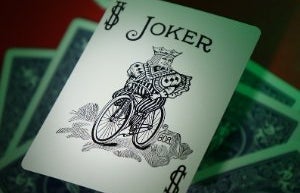Following a history of appearances and feature films, the renowned super-villain the Joker is no stranger to the silver screen. When comedian and filmmaker Vera Drew used the Clown Prince of Crime for her latest movie, however, she wasn’t looking for a laugh.
Drew’s passion project The People’s Joker, which she wrote, directed, and stars in, debuted at the Toronto Film Festival on September 13 and was met with positive, if not slightly bemused reception. The film is largely autobiographical, a transgender coming-of-age narrative that follows Drew embracing her identity. Diverting from reality, Drew intertwines her origin story with that of the Joker. The film is riddled with DC Comics characters and locations and plays with quotes directly stripped from previous Batman films, all parodying the popular culture giant and enriching Drew’s story—one scene recreates Harley Quinn’s dive into a vat of acid from the 2016 Suicide Squad film but replaces the chemicals with concentrated estrogen.
From its premiere showing, The People’s Joker asserted itself as a manic powerhouse and creative inspiration, promising a message that truly embraces the representative ability of superheroes, or supervillains. Those present at the TIFF showing were fortunate to have witnessed such a spectacle, as the next day, Warner Bros. slammed Drew with legal threats and forced her to pull the film from all following screenings.
According to TIFF’s official website, Warner Bros. snuffed The People’s Joker “due to rights issues” concerning copyright infringement, though Drew worked extensively with a copyright lawyer to ensure the film qualified under parody law and fair use. The lawyer receives a full-screen credit and the movie opens with multiple disclaimers stating it is an unauthorized parody. These legal precautions support that Warner Bros.’ intentions were not focused on copyright, instead drawing attention to a much larger issue.
Speaking with VMA major Aisling McDermott (she/he/they), an avid comic book fan, the news that The People’s Joker was pulled over a “rights issue” immediately made them think of “Spider-Man: Lotus, which is one of the most popular Spider-Man fan-made films that has not had any problems with copyright. There’s every reason for [Disney] to actually pull that because of copyright but there’s no queer characters in it and there’s no diverse characters in it so it hasn’t been pulled, which is quite telling.”
Spider-Man: Lotus, which is neither affiliated with Sony nor Disney, has amassed a significant fanbase since it was announced in 2021. To the disappointment of many of those fans, the film’s wide release was ultimately canceled, provoked not because of studio intervention but because of racist misconduct concerning the film’s director and star. Spider-Man: Lotus fit the mold of a traditional superhero film and was permitted by Disney to exist as one. If not for the controversy surrounding it, the movie would have released as planned and was projected for major success which, as McDermott said, is telling.
But superheroes are not meant to be two-dimensional. They are meant to represent those in need of representation, to showcase the greatest potential in people. This intent has been somewhat manipulated by big-budget superhero films that have become comfortable replicating an action-driven formula with a moral wedged in, distracting from superheroes’ actual power. WLP major Murph (they/them) is critical of this aspect of superhero films, noting, “As a whole I understand the appeal of [superhero films]… superheroes, they’re cool, they have cool abilities, and you can relate to them. But I do think that it’s basically a monopoly of movies. Like the film industry, the military has to approve it and fund some of it and it’s just a way to; I don’t know. It’s like propaganda to me. It’s just very strange as a whole.”
The military is a notable force in the film industry, swaying certain studio decisions and partially funding projects in exchange for equipment or location use. Corporate funding is similarly unavoidable in big-budget films, which is underscored by a 2020 Guardian article explaining how Apple does not let villainous characters use iPhones—this standard is how some fans uncovered a plot twist in the 2021 series The Falcon and the Winter Soldier.
In making The People’s Joker, however, these external influences were absent from the filming process. Drew’s vision and story were prioritized, creating a product that was truly original and meaningful. Learning of The People’s Joker, VMA major Matthew Pelton (he/him) was disheartened to hear of its situation and defended Drew, saying, “She’s the one who created it, it’s her own story, she has any right to pick which way she expresses that.”
Though The People’s Joker is Drew’s story, it has the potential to resonate with the trans community on a vast scale. Its censorship battle reflects the overwhelming lack of representation in the film industry and the actual issue Warner Bros. raised by interfering. This is not a copyright issue but one of capitalism and community. Social stakes such as these are why it is crucial to restructure the film industry into a more inclusive space, one that better represents the underrepresented.
To do so, McDermott has a few suggestions: “Have queer writers in the writer’s room! Have queer directors! Have queer people on set! Have queer actors that actually know how to properly navigate the world as a queer person and what these characters would realistically do and express joy but also the anguish of being queer, the hardships… But to get more diverse and meaningful queer representation, prioritize queer crew and cast on your sets.”
Though tedious improvements are being made, the release of The People’s Joker would be a notable victory in diversifying the film industry. Until then, the film and those it represents wait for their story to be told.
The People’s Joker is a promise, one of genuine representation in a world pitted against it. Whether that is within the confines of Gotham City or a courtroom against Warner Bros. is yet to be discovered, but Drew is determined to share her film with the world somehow, someday. In a statement released on social media on September 20, Drew asked fans to stay with her during this process, assuring this is not where The People’s Joker ends. “I’ll keep you posted every step of the way that I can,” she said, “And you know where you can send your angry letters.”


